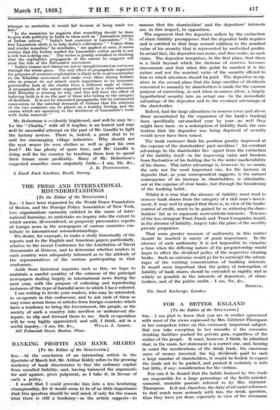BANKING PROFITS AND BANK SHARES (To the Editor of the
SPECTATOR.] SIR,—At the conclusion of - an • interesting article in the Spectator of March 3rd, Mr. Arthur Kiddy refers to the growing tendency of bank directorates to free the ordinary capital from uncalled liability, and, having balanced the arguments
• for and against, gives judgment, as I take it, in favour of such a policy.
- I would that I could provoke him into a less hesitating championship, for it would seem to be of no little importance that this question Should be well aired, if only for the reason • that there is still a tendency—as the article suggests—to -assume that the shareholders' and the depositors' interests are, in this respect, in opposition.
The argument that the depositor suffers by the extinction of share liability presupposes that the depositor both requires and is entitled to that large annual addition to the nominal value of his security that is represented by undivided profits. In actual fact, the depositor can make, and does make, no such claim. The depositor recognizes, in the first place, that there is a limit beyond which the increase of reserves becomes uneconomic and that when this point be reached it is the nature and not the nominal value of the security offered to him to which attention should be paid. The depositor recog- nizes in the second place that the large sacrifice of dividends consented to annually by shareholders is made for the express purpose of converting, as and when resources allow, a largely hypothetical security into an actual one—to the immediate advantage of the depositor and to the eventual advantage ol the shareholder.
Indeed, had the large allocations to reserve (over and above those necessitated by the expansion of the bank's trading) been specifically ear-marked year by year—as well they might have been—to a redemption of liability fund, the con- tention that the depositor was being deprived of security would never have been raised.
The bank customer finds his position greatly improved at the expense of the shareholders' past sacrifices ! An eventual advantage to the shareholder lies—apart from the extinction of the liability itself—in the improving value and freedom from fluctuation of his holding due to the wider marketability of his shares. This latter advantage is, however, by no means the only nor the most important one, for the increase in deposits that, as your correspondent suggests, is the natural consequence of an increase in shareholders, is obtainable, not at the expense of rival banks, but through the broadening of the banking habit.
Whilst it is true that the absence of liability must tend to remove bank shares from the category of a rich man's invest- ment, it may well be argued that there is, in view of the banks' control of credit, much to be gained by so widening the share- holders' list as to represent more catholic interests. Tru•itees of the less stringent Trust Funds and Trust Companies would, in the absence of liability, largely take the place of the wealthy private proprietor.
That some greater measure of uniformity in this matter should be reached is surely of great importance. In the absence of such uniformity it is not impossible to visualize a time when the differing nature of the proprietorship would begin to affect the dividend policy of the respective clearing banks. Such an outcome would go far to outweigh the advan- tages of the existing concentration of banking interests. It would seem important that the policy of redemption of liability of bank shares should be extended as rapidly and as widely as possible in the interests of depositors, of share- holders, and of the public credit.—! am, Sir, &c.,










































 Previous page
Previous page